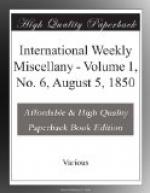“And what was it?” inquired Edward.
“He never told us, for, as you well know, he was reserved by nature; but we gathered from some words that he let slip, that an early and sudden death was foretold. Alas! your narrative has confirmed the truth of the prediction.”
“Wonderful! He always had a similar foreboding, and many a time has he grieved me by alluding to it,” said Edward; “yet it never made him gloomy or discontented. He went on his way firmly and calmly, and looked forward with joy, I might almost say, to another life.”
“He was a superior man,” answered the Baron. “whose memory will ever be dear to us. But now I will detain you no longer. Good night. Here is the bell”—he showed him the cord in between the curtains—“and your servant sleeps in the next room.”
“Oh, you are too careful of me,” said Edward, smiling; “I am used to sleep by myself.”
“Still,” replied the Baron, “every precaution should be taken. Now once more good night.”
He shook him by the hand, and, followed by the servant, left the room.
Thus Edward found himself alone, in the large, mysterious-looking, haunted room, where his deceased friend had so often reposed; where he also was expected to see a vision. The awe which the place itself inspired, combined with the sad and yet tender recollection of the departed Ferdinand, produced a state of mental excitement which was not favorable to his night’s rest. He had already undressed with the aid of his servant (whom he had then dismissed,) and had been in bed some time, having extinguished the candles. No sleep visited his eyelids; and the thought recurred which had so often troubled him, why he had never received the promised token from Ferdinand, whether his friend’s spirit were among the blest—whether his silence (so to speak) proceeded from unwillingness or incapacity to communicate with the living. A mingled train of reflections agitated his mind; his brain grew heated; his pulse beat faster and faster. The castle clock tolled eleven—half-past eleven. He counted the strokes: and at that moment the moon rose above the dark margin of the rocks which surrounded the castle, and shed her full light into Edward’s room. Every object stood out in relief from the darkness. Edward gazed, and thought, and speculated. It seemed to him as if something moved in the furthest corner of the room. The movement was evident—it assumed a form—the form of a man, which appeared to advance, or rather to float forward. Here Edward lost all sense of surrounding objects, and found himself once more sitting at the foot of the monument in the garden of the academy, where he had contracted the bond with his friend. As formerly, the moon streamed through the dark branches of the fir-trees, and shed its pale cold light on the cold white marble of the monument. Then the floating form which had appeared in the room of the castle became clearer, more substantial, more earthly-looking; it issued from behind the tombstone, and stood in the full moonlight. It was Ferdinand, in the uniform of his regiment, earnest and pale, but with a kind smile on his features.




